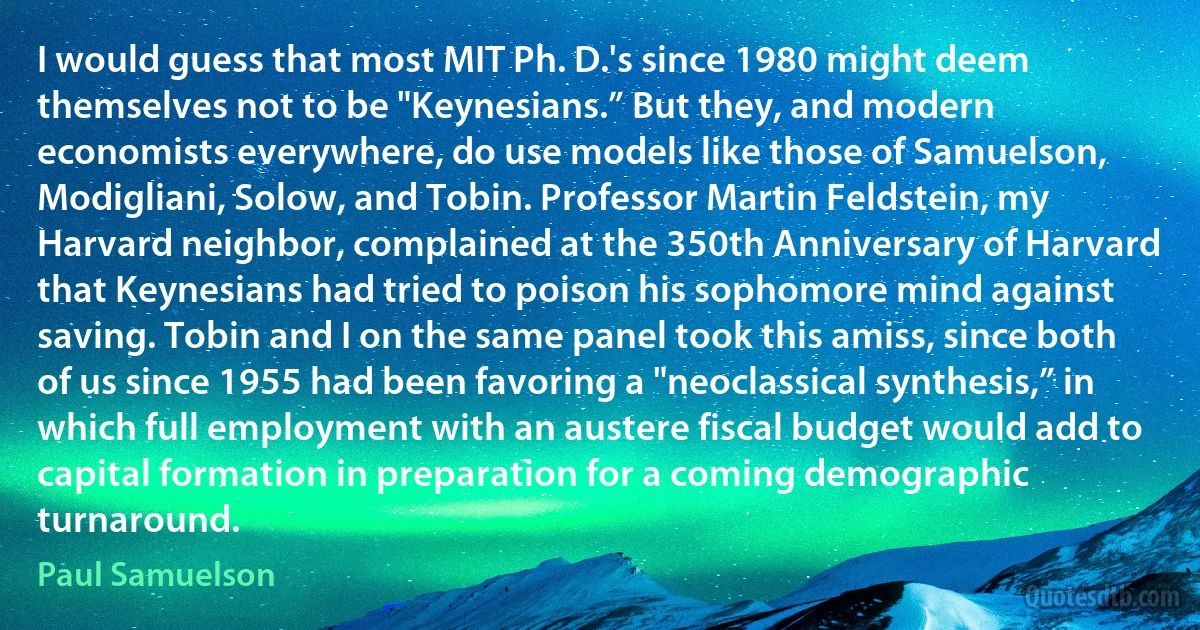
I would guess that most MIT Ph. D.'s since 1980 might deem themselves not to be "Keynesians.” But they, and modern economists everywhere, do use models like those of Samuelson, Modigliani, Solow, and Tobin. Professor Martin Feldstein, my Harvard neighbor, complained at the 350th Anniversary of Harvard that Keynesians had tried to poison his sophomore mind against saving. Tobin and I on the same panel took this amiss, since both of us since 1955 had been favoring a "neoclassical synthesis,” in which full employment with an austere fiscal budget would add to capital formation in preparation for a coming demographic turnaround.
Paul SamuelsonRelated topics
add anniversary coming deem fiscal formation full might mind neighbor panel poison sophomore synthesis take try use turnaround Harvard neoclassical 1980 demographicRelated quotes
With Pearl Harbour I think our people know full well it was coming. They always have a cover story, of course. [..... ] They knew full well Pearl Harbour was going to be bombed. [.... ] They wanted that to bring us into the war. So I think people wanted very much something like 9-11. Whether those specific buildings or not, I don't know. A lot of shady stuff, like the buildings, I understand, were sold or something or insurance policies taken out, you know, just a few weeks before that. Buildings that hold 50,000 people only had, you know, 3000 killed. Lot of folks were told not to come to work. Somebody knew what was going on.

Kent Hovind
We are placing burdens on the broadest shoulders. Why should I put burdens on the people? I am one of the children of the people. I was brought up amongst them. I know their trials; and God forbid that I should add one grain of trouble to the anxieties which they bear with such patience and fortitude. When the Prime Minister did me the honour of inviting me to take charge of the National Exchequer at a time of great difficulty, I made up my mind, in framing the Budget which was in front of me, that at any rate no cupboard should be barer, no lot would be harder. By that test I challenge you to judge the Budget.

David Lloyd George
My reaction to "creative capitalism” as lauded by Bill Gates, Warren Buffett, Michael Kinsley, and (somewhat to my surprise), Professor Glaeser of the Harvard Economics Department is a skeptical one. The embrace of massive corporate charity, the criticism of capitalism by its greatest beneficiaries, and the frequent resort by the advocates of "creative capitalism” to platitudes (such as: "the world is getting better, but not fast enough and not for everyone”; "today's miracles of technology only benefit those who can afford them”; "economic demand is not the same as economic need”), along with the vagueness of the term itself, leave me with an uncomfortable feeling.

Richard Posner
I remain detached and distant, but it is under my eyes and my orders that the work of art must create itself [Klein directed on 9 March 1960 for the first time nude models who were painting the walls with their moving naked bodies, he called this "Anthropometry"]. Then, when the creation starts, I stand there, present at the ceremony, immaculate, calm, relaxed, perfectly aware of what is going on and ready to welcome the work of art that is coming into existence in the tangible world... Hours of preparation for something that is executed, with extreme precision, in a few minutes. Just as with a judo throw.

Yves Klein
Modern man, seeking a middle position in the evaluation of sense impression and thought, can, following Plato, interpret the process of understanding nature as a correspondence, that is, a coming into congruence of pre-existing images of the human psyche with external objects and their behaviour. Modern man, of course, unlike Plato, looks on the pre-existent original images also as not invariable, but as relative to the development of a conscious point of view, so that the word "dialectic" which Plato is fond of using may be applied to the process of development of human knowledge.

Wolfgang Pauli
